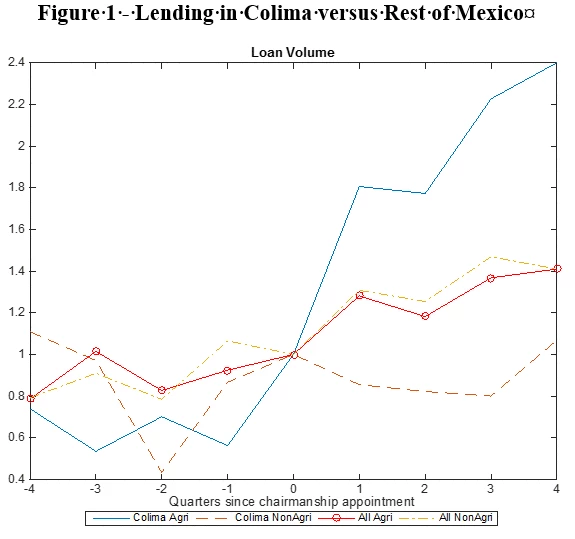Our paper studies the existence of political rents in bank lending in Mexico. Unlike prior studies examining political rent seeking in public sector banks, we focus on an economy with a fully privatized banking sector where the existence of political rent seeking is not obvious.
The data that we use corresponds to the universe of commercial bank loans in Mexico from 2003 to 2012. We classify firms as politically connected if they are located in a state that elected a senator who at a particular time chaired an important senate committee. 1 We then narrow down our definition of political connection by focusing on firms that, in addition to being headquartered in the same state, operate in an industry related to the purview of the chairman’s commission, or are located in the same municipality in which the chairman lives. Having this classification of political connection allows us to exploit within-firm variation over time, and compare a firm’s loan terms and performance when it is politically connected and when it is not.
So why would private banks favor politically connected firms? Chairing a committee signals political power from which banks may benefit. Key committees tend to be chaired by senators with strong political influence that are also more likely to hold federal or state appointments in the future. Moreover, chairmanship is entrusted with discretional powers over economic resources, and chairmen are perceived to be able to influence policies and legislation affecting specific industries, among which banking.
Figure 1 illustrates an example of the presence of political connections in the banking sector, and provides some intuition of our identification strategy. The figure contrasts the dynamics of credit supply to agriculture and all other industries of Colima with that of the average state in Mexico (excluding Colima) around the time that a senator from the state of Colima was appointed as the chairman of the agriculture committee. In the year leading up to the appointment, lending to Colima exhibited a similar pattern to the rest of the states of Mexico. However, in the quarters immediately after the election, lending to the agriculture industry in Colima more than doubled, while lending to other industries in Colima actually decreased a touch. Elsewhere, lending in the remaining Mexican states, both in agriculture and in other industries, increased at a more moderate pace.

We document more rigorously this pattern to show that firms headquartered in the state that elected a senator chairing a commission receive more generous loan terms. We isolate the bank-lending channel, and exclusively analyze a firm’s borrowing patterns over time, by introducing firm*bank fixed-effects. This specification allows us to fully absorb invariant firm-specific fundamentals that proxy for credit demand, and compare how a firm's loan terms vary from when a chairman resides in the same state to when the chairman does not. We also saturate our specification with bank*quarter and industry*quarter fixed-effects to control for unobserved time-varying shocks to the bank and industry fundamentals such as risk or investment opportunities.
Our results suggest that being politically connected -under our broader definition- leads to a 0.7 percent increase in the loan volume lent by commercial banks, and to a 5 and 6 percent reduction in the interest rate spread and probability of collateral requirement respectively. Political loans also exhibit significantly worse performance with the default probability rising 12 percent. The magnitude of these results becomes substantially larger when using our narrower definition of political connection: firms that either share the same sector or same municipality to the chairman increase their loan volume by around 2.7 percent.
Regarding the dynamics of political lending along the political cycle of a chairman's three-year term, we find that the impact of the chairman's presence increases during the legislative session, reaching a peak as the upcoming congressional elections near. We further find that large and domestic banks engage more in political lending, consistent among other things, with the fact that the leadership of domestic banks tends to have stronger relations with national politicians.2
Our results suggest that firm’s real economic activity is also affected by political lending: being chairman of a given committee is associated with a 2.1 percent increase in employment in firms headquartered in the chairman’s state. We also find an impact on the firm’s finances, including total assets, liabilities and revenues. Consistent with frictions due to asymmetric information in the “large versus small” literature, the impact of credit supply channel varies with firm size, and the effect is significantly stronger for small firms.
We also find that banks that engage more in political lending receive significantly more government borrowings, and with better quality. This finding suggests that politicians use their political power over government borrowing to offer benefits to banks in return for the political loans.
Given the comprehensive coverage of our loan data, we estimate the economic cost of the documented political rents by focusing on the two dimensions that we can infer from the data. First, the deadweight loss from the increase in default loans is estimated to be 0.4 basis point of Mexico’s annual GDP. Given that according to an OECD report, the cost of political rents is of about 5 percent of GDP, political lending comprises 0.08 percent of the political rents in Mexico. Second, we document evidence of an additional distortion of commercial credit allocation: firms in the chairman’s state but not in an industry under its purview suffer from credit under-provision as a result of the political lending. Finally, we show that banks reap a net benefit from engaging in the rent provision activity of 1.6 percent of their annual net income.
Our results suggest that banks use lending to politically connected firms to exchange favors with politicians and confirm the importance of rent-seeking in influencing the lending decisions of financial intermediaries, in this case private banks. The study also provides an insight on the long-standing debate on the long-run benefit of privatization. Privatization advocates often assume that it will necessarily eliminate rent-seeking behavior through competition and crowding out political interventions. However, we still find evidence of political rent in bank lending of a privatized economy. A better way to overcome the root problem of rent seeking may be stricter regulation in terms of increased reporting requirement, scrutiny of illegal transactions and closer supervision.
[1] Given that chairmanship of a committee is determined through the bargaining among different political parties once all senators are elected, the selection of chairmanship is basically unrelated to either tactical voting or events and conditions in the chairman’s state.
[2] We further conduct a series of tests to rule out alternative explanations and show the political lending pattern holds under a variety of specifications.





Join the Conversation